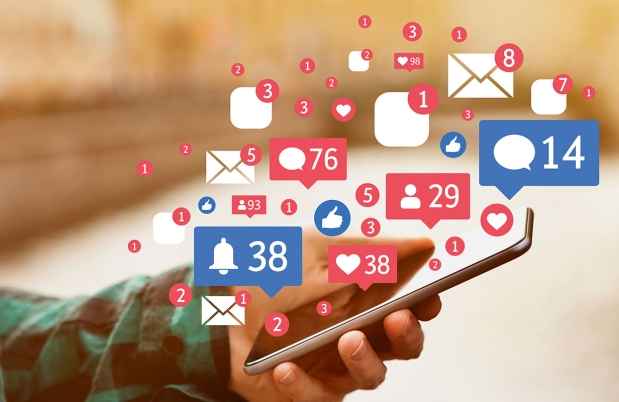The Link Between Social Media & Mental Health
Available with English captions and subtitles in Spanish.
Is it possible to break the habits of social media consumption? And even more importantly, how do we know when to log off and take care of ourselves?
Like it or not, social media has an effect on our mental health. Not only does it provide a lens in which you can see what you’re missing out on, having a filter put on appearances and life events can make it hard to tell what’s real and what isn’t.
This content is also available in Spanish.
Audience Questions
Dr. Lisa Coyne discusses the impact of social media on our mental health, shares how to set ground rules for digital consumption for you and your loved ones, and answers questions about loosening the grasp social media has on so many of us.
- Can you talk a bit about the impact of social media and how it may be impacting us more than we think?
- Can you talk about the “endless scroll” and how it contributes to making social media so addicting?
- How do you find different ways to access the news when so many people are using social media as a news platform?
- What is ASMR (autonomous sensory meridian response)?
- How do we limit our time on social platforms, and how can we be confident in knowing that we can pull ourselves away from social media?
- Cities, towns, and schools are using social media to communicate. Any suggestions around using these platforms in a more responsible manner to stay in the loop without being sucked in? It’s tough to do this with companies finding ways to pull us in.
- I’m having a hard time limiting screen time for my children, considering the limited capacity for leaving the house. Would you recommend placing limits on kids in terms of using social media? How can you approach this with minimal conflict—and how do you address the conflict?
- How do we stay mindful of the content we are following or engaging with in order to curate a healthy collection of information in our feeds?
- While there are lots of concerns around social media, there can be positive aspects as well, especially for breaking through stigma. Those who are in recovery—for example, from an eating disorder—have found that following specific accounts to be incredibly helpful. Are you aware of other groups who are also finding benefits to social media in their recovery?
- Do we know if there are personality traits that lead to some people being more likely to spend more time on social media than others? Has there been research done on this?
- Has research been done on dating apps and whether or not these are affecting our interpersonal relationships? The function of swiping on faces seems like there may be some gamification happening in who we want to spend the rest of our lives with!
- It seems as if many people are now following multiple screens at the same time, for example, using the phone while watching TV or using the phone while working on the computer. Is this accelerating us having lower attention spans? Is this problematic for individuals who already live with ADHD?
- Do you know any details as to whether there’s a digital detox process, and if so, what it may physically and mentally feel like for individuals?
- Can you talk about the effect that filters have on how we perceive each other and ourselves? How does this impact our emotional well-being and our self-esteem?
- Millions of people are part of online communities that play games together, people who likely would not be otherwise participating in these activities in this type of social way. The same could be said for highly engaged Facebook groups or other online communities. Is there any evidence related to the positive aspects of our connectedness or proof that social media has helped some of our relationships?
- How do I negotiate limits on screen time or social media with my spouse or partner?
- Have you tried to withdraw or disconnect from a social media platform yourself? What was your experience with it?
The information discussed is intended to be educational and should not be used as a substitute for guidance provided by your health care provider. Please consult with your treatment team before making any changes to your care plan.
Resources
Dr. Coyne mentioned these additional resources during the session:
About Dr. Coyne
Lisa W. Coyne, PhD, is an assistant professor of psychology in the Department of Psychiatry, part-time, at Harvard Medical School, and is a senior clinical consultant at the Child and Adolescent OCD Institute (OCDI Jr.) at McLean Hospital.
Dr. Coyne has published numerous peer-reviewed articles and chapters on anxiety, OCD, and parenting. She is the author of “The Joy of Parenting: An Acceptance and Commitment Therapy Guide to Effective Parenting in the Early Years,” a book for parents of young children.
Recent books by Dr. Coyne:
- Stuff That’s Loud: A Teen’s Guide to Unspiraling When OCD Gets Noisy
- Acceptance and Commitment Therapy: The Clinician’s Guide for Supporting Parents
- The Joy of Parenting: An Acceptance and Commitment Therapy Guide to Effective Parenting in the Early Years
Learn more about Dr. Coyne.
More Webinars
It’s important to think about ways to manage your mental health. McLean is committed to providing mental health and self-care resources for all who may need them. You and your family may find these strategies from McLean experts helpful to feel mentally balanced in your everyday lives.
Sign up now for the next webinar in our Mental Health Webinar Series.
Originally aired on October 29, 2020



